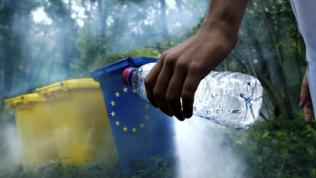BRUSSELS - Waste incinerators instead of recycling, highways running through nature parks, airports in protected areas - 33 projects in central and eastern Europe funded with €16 billion out of the EU's regional policy coffers are "environmentally harmful", says a study published on Thursday (2 February) by Friends of the Earth Europe and Bankwatch, a coalition of environmental NGOs.
"These 33 projects are economically dubious, socially harmful and in breach of environmental law," Markus Trilling from Friends of the Earth Europe said during a press briefing.
He noted that while EU leaders are in the "hot phase" of negotiating the next EU budget for 2014-2020, current spending practices need to be altered if Europe is serious about its climate change and environmental targets.
Cohesion policy - the EU term for the €347 billion allocated in 2007 to 2013 mainly to Europe's former Communist countries to revamp schools, roads and other infrastructure - has to follow broad EU outlines for sustainable or environmental-friendly targets. But it is ultimately up to national governments to approve the individual projects.
"What we have found is that they are funding unsustainable, unmodern investments. Decision makers have not learnt from the past experience of Spain, Portugal, Greece - once the biggest recipients of structural funds - where money was used to fuel housing bubbles and to construct highways instead of a more balanced approach, such as more public transportation, railways, investments in energy efficiency," Trilling said.
In Bulgaria, the EU's poorest member, waste management is still far away from any recycling practices seen in the western countries, said Genady Kondarev from Bankwatch.
A project worth €184 million pending EU approval aims at incinerating all waste collected in the Bulgarian capital, Sofia, which is currently being transported and piled up in large landfills outside the city. "Almost 100 percent of the waste is landfilled. Only a marginal 1.9-2.5 percent is being recycled, mainly by Roma going through the garbage and selling some of the recycled materials," Kondarev said.
If the project is approved, the timid government effort to get people to sort rubbish will be even less effective, he argued. "Already people are very sceptical about the different coloured bins, since they see that they all go in the same garbage vans. With an incinerator, there will be no incentives for recycling," he explained.
Other projects, such as the Salgotarjan biomass power plant in Hungary, may look environmentally friendly, but risks creating a perverse effect.
"Because of its reliance on waste wood from forestry and chopped logs, logging would increase pressure on surrounding forests, where not enough wood is produced annually to fuel a power plant with even 20 percent less capacity. Also the plant would be constructed in a populated area, so air pollution and low-particulate dust is of major concern," the study says.
euobserver.com
Τελευταία νέα
- EUROPALO Εγκύκλιος 17/04/2024: Διεθνής Ημέρα Αγγλικής Γλώσσας – Υποψήφιοι Ειδικής Μέριμνας ESB, EUROPALSO, ειδικές συνθήκες εξέτασης
- Διαδικτυακό σεμινάριο Speaking ESB, Σάββατο 20/4/2024, 11.00 π.μ.
- EUROPALSO Εγκύκλιος 10/04/2024: Διαδικτυακή παρουσίαση ΕΕΑ για πλατφόρμα CRM, 12/4 – Ημερομηνίες εξετάσεων Θερινής Περιόδου – Διαδικτυακό σεμινάριο Speaking ESB, 20/4 – Καλοκαιρινή εκδρομή στη Νάξο – Νέες αμοιβές, ωρομίσθια – Φορολογικά
- Αύξηση κατώτατου μισθού, από 1/4/2024: Τα νέα ωρομίσθια και οι αμοιβές για ΚΞΓ
- EUROPALSO - Τι είναι το IRIS - Τι ισχύει για τις επιχειρήσεις και ΚΞΓ
- Ψηφιακή πλατφόρμα τύπου CRM για Κέντρα Ξένων Γλωσσών - Δυνατότητες - Διαδικτυακή παρουσίαση για ιδιοκτήτες ΚΞΓ
- EUROPALSO Εγκύκλιος 02/04/2024: Ημερομηνίες εξετάσεων Θερινής Περιόδου – Διαδικτυακή παρουσίαση ΕΕΑ για πλατφόρμα CRM, 12/4 – Διαδικτυακό σεμινάριο Writing ESB, 6/4 – Εξετάσεις για ενήλικες – Νέες αμοιβές, ωρομίσθια – Εγγραφή σε σύστημα IRIS
- ReLearning with Express Publishing: Mια διαδραστική σειρά σεμιναρίων σε όλη την Ελλάδα!
- EUROPALSO - ΦΟΡΟΛΟΓΙΚΕΣ ΥΠΟΧΡΕΩΣΕΙΣ ΑΠΡΙΛΙΟΣ 2024
- Διαδικτυακό σεμινάριο Writing (ESB), Σάββατο 6/4/2024, 11.00 π.μ.


